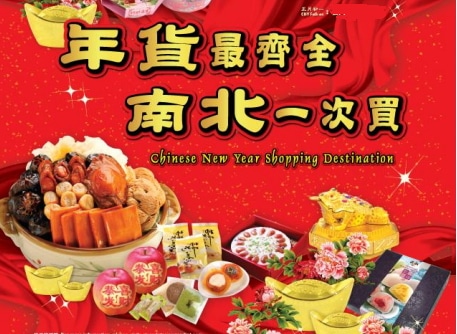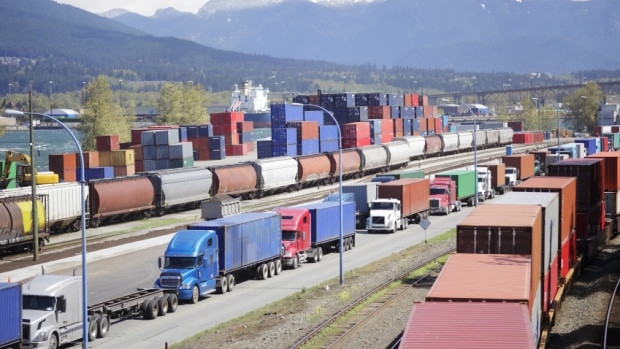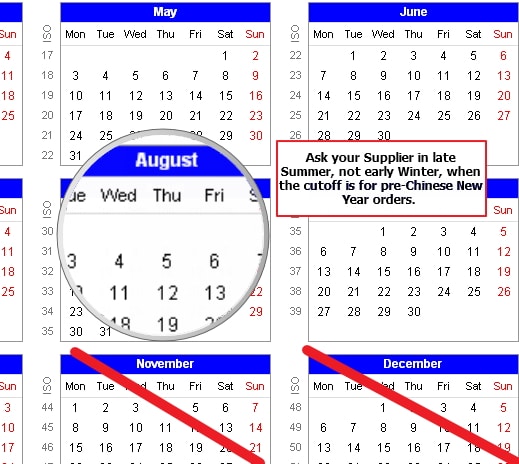5 Chinese New Year Tips for Amazon Sellers
Most seasoned importers and Amazon sellers have Chinese New Year firmly marked on their calendars. They know that the time leading up to Chinese New Year can do havoc on their shipments and business. The basic mantra is “Expect delays”.
In this article, I'm going to give five tips I've learned concerning Chinese New Years. While the basic mantra remains the same, “Expect delays”, I'll try and give some more specific lessons I've learned over the years.
What Is Chinese New Year?
A lot of times, Chinese New Year (also referred to as the Spring Festival or CNY) gets compared to Christmas in the West. The truth is, it is more or less comparable to Christmas.. It seems every culture has their big holiday throughout the year and China is no different.
Around CNY, you have big family feasts, red envelopes are exchanged, and maybe some dumplings are made. Oh yeah, and there's a million WeChat “Happy New Year” messages exchanged.

In China though it's a vastly different affair. You may have seen the images of millions of Chinese workers traveling from the large city that they work in and going back to their small (small is always a relative word in China) home towns to visit family. For the Chinese worker who typically works 6 days a week and 10 hour+ days, this is the one time of the year to travel back home and see their family. In some ways it's similar to American Thanksgiving in this regard.
When is Chinese New Year? Let me make it simple…
Chinese New Year happens the second new moon after the winter solstice (December 20). A new moon is the opposite of a full moon (basically no moon).
It's roughly 30 days between moon cycles and depending on luck, the first new moon could be December 21st or as long as January 20th, meaning Chinese New Year will happen about 30 days after that. An example:
- Winter Solstice on Dec 21
- First new moon: Dec 23 → Second new moon: Jan 22 (Chinese New Year) (about 32 days after the start of Winter)
- Winter Solstice on Dec 21
- First new moon: Jan 21 → Second new moon: Feb 20 (Chinese New Year)(about 32 days after the start of Winter)
Clear as mud?
Why is it Call Spring Festival if It's In Winter?
So why is it called Spring Festival if it happens in the heart of Winter?
Well, historically China recognized the weather actually starts to warm up in February (which is true for most of us living in the North Hemisphere) so farmers start to prepare agricultural activities around then. So it kind of makes sense.
How Long Is Chinese New Year?
This is a little bit like asking how long is a piece of string. The answer is: it varies.
Usually, office workers (i.e. the sales person you're dealing with) get 5-10 days off. They're often from a big city and don't really commute back home.
For actual factory workers, they can get anywhere from 2 weeks to 6 weeks off to go back to their 老家 (laojia) – their hometown. This massive time off for factory workers is why everything slows to a stop for manufacturing.
Tip #1 Ask Your Supplier the Deadline for Chinese New Year Orders
Always ask your Supplier in advance when the latest you can submit an order by to have it completed before Chinese New Year. And I don't mean asking them in December. I mean WELL in advance.
I tend to ask my Suppliers “When do you need us to place an order by to have it completed by Chinese New Year?”. the summer preceding Chinese New Year. I know it's crazy to be thinking in August or September about your orders for February, but it's a necessity. It took me nearly five years of importing to finally catch on that you need to start thinking about your ordering nearly a full 6 months before Chinese New Year.
Here's another tip I like to use with my Suppliers: I'll send in an order to my Suppliers in September or October. Normally, Suppliers will simply ship the order as soon as it is done. Instead of them doing this, I instruct them to ship the order some time between January 1-15 (or whatever date you prefer) and no sooner, even if the order is completed sooner. It's a win-win: the Supplier gets lots of time to complete the order and it avoids us from receiving our inventory (and more importantly, having to pay for the inventory) too far in advance.
#2 Be Generous and Over-Order Inventory
If you have a great new Fishing Rod or other widget that you're importing and you realize in October that “Shit, we're going to run out of inventory of this product next month” well guess what? You're probably going to be out of stock until March or April, at the earliest, as your Supplier likely won't be able to ship your order before Chinese New Year.
Most of my company's products are seasonal, with our busy time starting in early Spring. In years past, I've ended up in the above situation of being left for months at a time out of stock of our most popular items. When I was in Business School they taught us the virtues of Just in Time inventory planning. It took me hundreds of thousands of dollars in lost sales to realize Just in Time inventory planning doesn't care about Chinese New Year.
I normally try to order 3 months of inventory at a time. When it comes to ordering around Chinese New Year, I like to order 4-5 months worth of inventory.
#3 Be Vigilant About Quality Control Before CNY
Just like when you scramble to get an essay done in the last minute you're bound to make careless typos and other mistakes, the same thing happens as your Suppliers scramble to get orders completed before the start of Chinese New Year. Quality control issues become more and more prevalent. Double stitched seams all of a sudden become single stitched, polished stainless steel becomes mostly polished stainless steel, and the list of potential quality control issues continues.
If you've sent in your order late to your Supplier and they're scrambling to get it completed in the last minute, you're likely hit with a catch-22: you know products may be of inferior quality but there's no time to correct any issues a third party inspection may reveal. The best solution is to, once again, send your orders in early to your Supplier. This avoids them rushing to complete your order and also gives you time to conduct a third party inspection and correct any problems that arise. If you don't have time to conduct a third party inspection, make sure you inspect your products thoroughly once they arrive to you. If you spot any problems, hopefully you can leverage your relationship with your Supplier and have them give you some concessions on future orders (either replacement items or a discount).
#4 Expect to Have Difficulties Getting Freight Bookings and Having Your Products Shipped
OK, you know that your Supplier has delays because of Chinese New Year, but did you know that the ports in China get backed up too? If you're trying to get a full container out of a Shanghai, Guangzhou, or another major port around Chinese New Year, you could be out of luck as sea freighters can get booked solid around this time (oh yeah, and you're probably going to pay more for sea freight around this time of year too). Make sure you and/or your Supplier books your shipment with your Freight Forwarder well in advance. Even if you manage to get a booking before Chinese New Year, you may not get your preferred shipping date, meaning your shipment could be delayed days or weeks.
In fact, delays around Chinese New Year are common at all points of the supply chain in China, from container ships to overland trucks to customs clearance. So yeah, expect delays.
What's the best solution? Either ship your products around November/December or after Chinese New Year around April.
#5 Expect Delays at Your Home Port

All those packed container ships mentioned above have to go somewhere, and your home port may be one of them. While your U.S. or U.K. port may not see the same back log that Chinese ports do, delays of a few days are not uncommon as container ships struggle to get appointments to unload at the ports. A couple of days delay might not mean life or death to your business, but if you're one of those people (ahem) who likes to promise customers set delivery days, or worse, list items on Amazon et al the day before you expect your items to arrive, you might want to think twice before doing this.
Conclusion
In conclusion, expect delays. Plan in advance. WELL in advance. It's really as simple as this.
What has your experience been around Chinese New Year? Have you ever missed the Chinese New Year cutoff and been left inventory-less for an extended period of time? Have you experienced any other issues around this time of year? If so, please comment below.






Hi David,
Very interesting article. Indeed, Chinese new year is always a complicated period of the year. Worth to mention that supplier are indeed sometimes playing the watch to ship the goods at the last moment and to skip quality control.
Nice article
Yes!!!! Excellent point – quality does tend to deteriorate around Chinese New Years.
Thank you! Great read